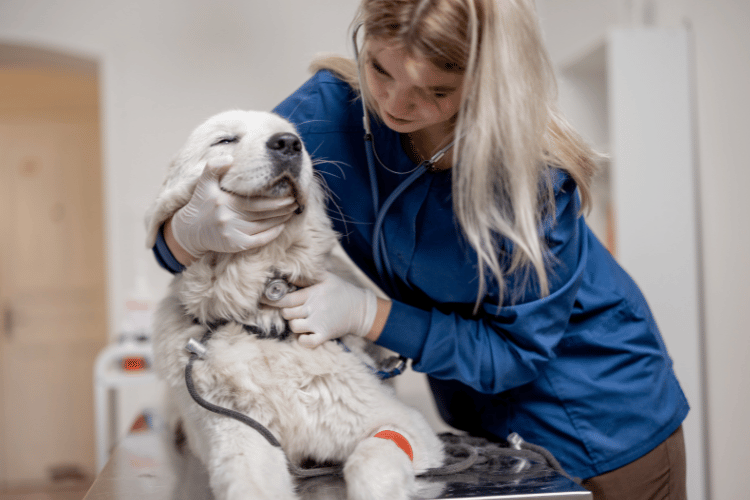The phrase ‘man’s best friend’ wasn’t given to dogs in jest. They really are great pets and make wonderful companions to have around.
Yet, sometimes we tend to take our cute fur balls for granted because of work and family. We forget that dogs also crave our love and attention.
The problem is that sometimes they don’t get much engagement from us. So, they act out, be disobedient, and behave in ways that we’d describe as ‘odd.’
One example is when your dog won’t get out of bed. If this sounds familiar, then you’ve come to the right place.
Keep reading to learn why this happens. We’ll also tell you what you can do to break the habit and get your dog used to sleeping on their own.
Why Is My Dog Refusing to Get Out of Bed?
Is your dog refusing to get out of your bed? It could be a way to get your attention and spend more quality time with you, their favorite two-legged friend.
They feel safe and happy when they’re close to you. Plus, your bed is probably super comfy and soft.
Another reason could be that they could be attracted to the scent you leave behind in your bed. After all, dogs are known for their super strong sense of smell.
To you, the dog is being stubborn and doesn’t respect boundaries. Yet, it could be much less menacing as they simply haven’t been trained to stay off.
On the other hand, if they don’t want to get out of their bed, that could mean they’re following their body’s internal clock and need more sleep. It could also mean they’re feeling a bit lethargic, which could be an indication of something more serious.
So, make sure you contact your vet and get your dog checked out as soon as possible.
Why Is My Dog Staying In Her Bed All Day?
We’re used to thinking that cats spend most of the day napping. Yet, according to canine experts, dogs spend around 50% of their day sleeping.
This tends to happen more frequently with senior dogs, large breeds, overweight dogs, and newborn puppies. Their internal clock signals to them that they need sleep, so they just conk out and won’t get out of bed until they’ve had sufficient rest.
Another reason is boredom. If your dog doesn’t get any physical or mental stimulation during the day, they’ll likely just head to a comfortable area and nap because there’s just nothing better to do.
The problem is that, with dogs, boredom tends to lead to destructive and bad behaviors. Dogs need constant enrichment activities to keep them healthy and happy. Otherwise, they become restless, irritable, and bark or chew excessively.

How Do I Get My Stubborn Dog Off the Bed?
Below are five of the best tried-and-true training approaches you can follow as a pet parent to get your dog off your bed and into their own.
Remember, this type of training can take weeks or months depending on how old your pooch is. So, be patient and, more importantly, stay consistent with your place training.
- Use short and easy commands like ‘off’ and point to the floor every time you see your dog on the bed.
- Point to their bed and say ‘place’ to describe their sleeping area and to give your dog a sense of direction.
- Switch between rewards like small treats, praise, affection, or their favorite toy to reinforce good behavior.
- Give your dog unlimited access to a comfy, cushy bed of their own.
- Set up their sleeping area near your bed or just outside the room to promote a sense of security for your furry friend.
What to Do When Your Dog Doesn’t Want to Get Up?
Here are a few ideas to help you figure out what to do in case your pooch doesn’t respond to getting up.
Medical Condition
Your first reaction to your dog not wanting to get up is to shrug it off as pure laziness. However, it could be something more serious like lethargy, which is the first sign of a possible underlying medical condition.
Dogs tend to put up a brave face. So, it’s unlikely that you’ll know anything is wrong until the pain becomes so severe and unbearable that they can no longer hide it.
So, if your dog still doesn’t want to get up after several tries, it’s time to call the vet. The sooner you act, the better handle you’ll have over whatever the situation might be.

Laziness
If your dog is suffering from good old laziness, there’s a way to cure that too.
To get your dog out of a laziness funk, get them moving outdoors. Take them out for a walk, go to the doggy park, toss a frisbee.
Set them up with a play buddy. Teaching them to socialize will make them more active and get used to being around people, other dogs, and loud noises.
Do you live near the beach? Then, why not enjoy some quality time with your pooch taking in the surf and sand?
If you’re into hiking, you can also take your dog along. It’s a great way to provide them with both the mental stimulation and physical exercise they need to live a long, healthy life.
Are you interested in reading our post, When Is It Too Hot to Walk a Dog? (Answered)
Why Does My Dog Not Want to Get Up or Move?
Sometimes your dog will want to sit still and not move at all. If your dog is low-energy by nature, then you probably have nothing to worry about.
On the flip side, if your dog is active and then suddenly doesn’t want to get up or move, it could be due to a lack of motivation, a change in their sleep cycles, or they’re just tired and need to rest.
It could also indicate something more serious like a health condition that causes them to feel discomfort or pain when moving. That’s why you must take your pooch to the vet immediately. Also, keep an eye out for other symptoms like:
- Changes in the consistency of their urine or stool
- Changes in the frequency of urinating or defecating
- Sudden changes in their habits or personality
- A sudden change in their energy levels
- Evidence of pain when moving
How Do You Know If Your Dog Has Depression?
Unfortunately, dogs are prone to clinical depression just as much as we are. According to research, about 75% of dogs may show signs of depression or anxiety at one point or another. This is usually due to significant changes in their lives, such as moving or the loss of a significant human.
The good news is that there are a handful of things you can do to help improve your dog’s mood. For example, you can spend more one-on-one time playing with them.
You can also give them plenty of exercise. Running, jumping, and being physically active helps maintain muscle mass, encourages healthy bones, and lowers blood pressure. In addition, being physically active reduces anxiety-related behavioral problems.
Dogs also thrive on mental stimulation because it engages their minds, fights off dementia, and promotes positive behavior. Plus, it helps prevent bad behaviors and lowers the risk of depression.
Here are some of the signs of depressed behavior in dogs:
- Needy or clingy behavior
- Increased irritability
- Lack of interest in activities
- Loss of appetite
- Changes in sleep patterns
You might like to also read, How Come Dogs Don’t Live Long?
Is My Dog Just Lazy?

One possible scenario for your dog not getting out of bed is that their dog is simply slowing down a bit in their later years of life. Or, it could be they’ve just been through some heavy activity or grueling training exercise and they just need to take it easy for a while.
Another thing to keep in mind is that some dogs are naturally less active than others. We’re often used to dogs as being fireballs with bundles of energy. So, we automatically assume that when a dog isn’t active most of the day, it must mean that something is wrong with them.
Here are some of the most common low-energy breeds:
- Bulldog
- Great Dane
- Newfoundland
- Pug
- Basset Hound
- Shih Tzu
- Saint Bernard
Final Thoughts
Now that you know some possible reasons why your dog won’t get out of bed, you know exactly how to handle the situation.
First, determine whether your pooch is naturally low-energy or just needs some rest and relaxation. If you suspect something more serious going on, have your vet check them out.
At the end of the day, the only thing your dog wants from you is TLC. So, if they’re acting out or being stubborn, schedule some quality one-on-one playtime with your dog to give them the mental and physical stimulation they need.
Then, during training, remind yourself to be firm, but gentle. Stay consistent with a daily routine and always give them positive reinforcement for good behavior.




